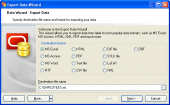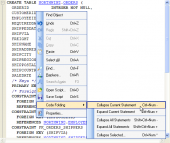Oracle Maestro online help
| Prev | Return to chapter overview | Next |
Setting collection properties
This step is provided for specifying the new collection properties in the most convenient way.
Name
The field represents the new collection name as it was set on the previous wizard step.
Owner
The field displays the owner of the collection.
Kind (Varying array, Nested table)
Nested table hold an arbitrary number of elements. They use sequential numbers as subscripts. You can define equivalent SQL types, allowing nested tables to be stored in database tables and manipulated through SQL.
Varying array (short for variable-size arrays) hold a fixed number of elements (although you can change the number of elements at runtime). They use sequential numbers as subscripts. You can define equivalent SQL types, allowing varrays to be stored in database tables. They can be stored and retrieved through SQL, but with less flexibility than nested tables.
VArray Size
A varray has a maximum size, which you specify in its type definition. Its index has a fixed lower bound of 1 and an extensible upper bound. For example, the current upper bound for varray Grades is 7, but you can increase its upper bound to maximum of 10. A varray can contain a varying number of elements, from zero (when empty) to the maximum specified in its type definition.
Element type
Any PL/SQL datatype except BINARY_INTEGER, BOOLEAN, LONG, LONG RAW, NATURAL, NATURALN, PLS_INTEGER, POSITIVE, POSITIVEN, REF CURSOR, SIGNTYPE, or STRING. Also, with varrays, element_type cannot be BLOB, CLOB, or an object type with BLOB or CLOB attributes.
| Prev | Return to chapter overview | Next |





 Download
Download Buy
Buy
